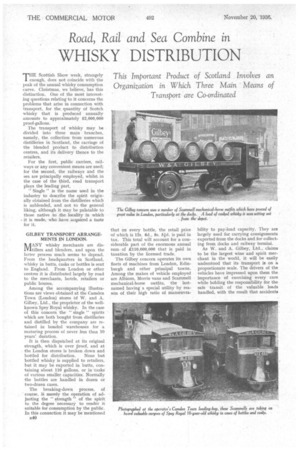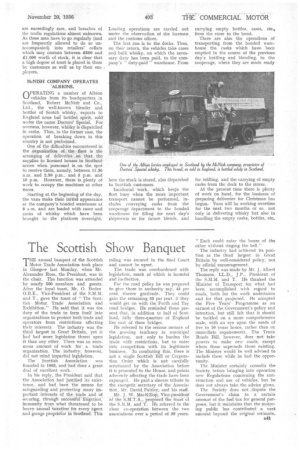Road, Rail and Sea Combine in
Page 54

Page 55

If you've noticed an error in this article please click here to report it so we can fix it.
WHISKY DISTRIBUTION
This Important Product of Scotland Involves an Organization in Which Three Main Means of Transport are Co-ordinated
iTHE Scottish Show week, strangely I enough, does not coincide with the peak of the annual whisky consumption curve. Christmas, we believe, has this distinction. One of the most interesting questions relating to it concerns the problems that arise in connection with transport, for the quantity of Scotch whisky that is produced annually amounts to approximately 52,000,000 proof-gallons.
The transport of whisky may be divided into three main branches, namely, the collection from numerous distilleries in Scotland, the carriage of the blended product to distribution centres, and its delivery thence to the retailers.
For the first, public carriers, railways or any convenient means are used; for the second, the railways and the sea are principally employed, whilst in the case of the third, road transport plays the leading part, " Single " is the name used in the industry to describe the spirit originally obtained from the distilleries which is unblended, and not to the general liking, although it may be palatable to those native to the locality in which it is made, who have acquired a taste for it.
GILBEY TRANSPORT ARRANGEMENTS IN LONDON. MIANY whisky merchants are dis11U-fillers and blenders, and upon the latter process much seems to depend. From the headquarters in Scotland, whisky in butts, casks or bottles is sent to England. From London or other centres it is distributed largely by road to the merchants, hotels, retailers or public houses.
Among the accompanying illustra tions are views obtained at the Camden Town (London) stores of W. and A. Gilbey, Ltd., the proprietor of the wellknown Spey Royal whisky. In the case of this concern the " single " spirits which are both bought from distilleries and distilled by the company are retained in bonded warehouses for a maturing process of never Jess than 10 years' duration.
It is then dispatched at its original strength, which is over proof, and at the London stores is broken down and bottled for distribution. None but bottled whisky is supplied to retailers, but it may be exported in butts, containing about 110 gallons, or in •casks of various smaller capacities. Normally the bottles are handled in dozen or two-dozen cases.
The breaking-down process, of
• course, is merely the operation of adjusting the " strength " of the spirit. to the degree necessary to render it suitable for consumption by the public. In this connection it may be mentioned
B40 that on every bottle, the retail price of which is 12s. 6d., Ss. 5-id. is paid in tax. This total will account for a considerable part of the enormous annual sumof £110,000,000 that is paid in taxation by the licensed trade.
The Gilbey concern operates its own fleets of machines from London, Edinburgh and other principal towns. Among the makes of vehicle employed are Albions, Morris vans and Scarrimell mechanical-horse outfits, the lastnamed having a special utility by reason of their high ratio of manceuvra
bility to pay-load capacity. They are largely used for carrying consignments exported from the docks and for collecting from docks and railway termini.
As W. and A. Gilbey, Ltd., claims to be the largest wine and spirit merchant in the world, it will be easily understood that its transport is on a proportionate scale. The drivers of the vehicles have impressed upon them the importance of exercising every • care while holding the responsibility for the safe transit of the valuable loads handled, with the result that accidents
are exceedingly rare, and breaches a the traffic regulations almost unknown. As these men have to go regularly (and are frequently allowed to do so unaccompanied) into retailers' cellars which may contain between £500 and. R.1,000 worth of stock, it is clear that a high degree of trust is placed in them by customers as well as by their emplayers.
McNISH COMPANY OPERATES 'ALBIONS.
r\PERATING a number of Albion
vehicles from its headquarters in Scotland, Robert McNish and Co., Ltd., the well-known blender and bottler of Scotch whisky, exports to England none but bottled spirit, sold' under the name Doctors' Special. For overseas, however, whisky is 'dispatched. in casks. Thus, in the former case, the operation of breaking down in this country is not performed.
One of the difficulties encountered in the ,organization„ of the fleet is the arranging of deliveries_ so that the supplies to licensed houses in Scotland arrive when personuel is on the spot to receive them, namely, between 11.30 a m._ and 2.30. p.m., and 5 p.m. and 1.0 p.m. However, there is plenty of work to occupy the machines at other times.
Starting at the beginning of the day, the vans make their initial appearance at the company's bonded warehouse at 8 a m. and are loaded with cases and casks of whisky which have been brought to the platform overnight. Loading operations are carried out under the observation of the foreman and the customs officer.
The first run is to the docks. Then, on their return, the vehicles take cases and bulk whisky, on which the necessary duty has been paid, to the company's " duty-paid " warehouse. From here the stock is stored, also dispatched to Scottish customers.
Incidental work, which keeps the fleet busy when the more important transport cannot be performed, includes conveying casks from the cooperage department to the bonded warehouse for filling for next day's shipments or for future blends, and carrying empty. bottles, cases, etc.. from the store to the bond.
There are also the operations of transporting from the bonded warehouse the casks which have been emptied in the course of the previous day's bottling and blending, to the cooperage, where they are made ready for refilling, and the carrying of empty casks from the dock to the stores.
At the present time there is plenty of work on hand, for the business of preparing deliveries for Christmas, has begun. Vans will be working overtime for the next two months or so, not only in delivering whisky but also in handling the empty casks, bottles, etc.




























































































